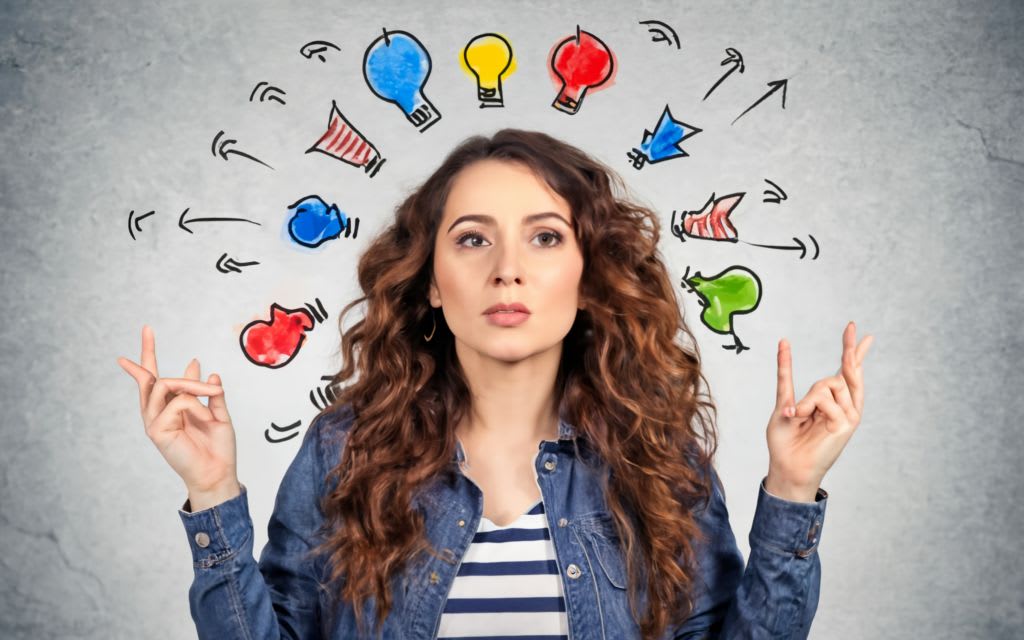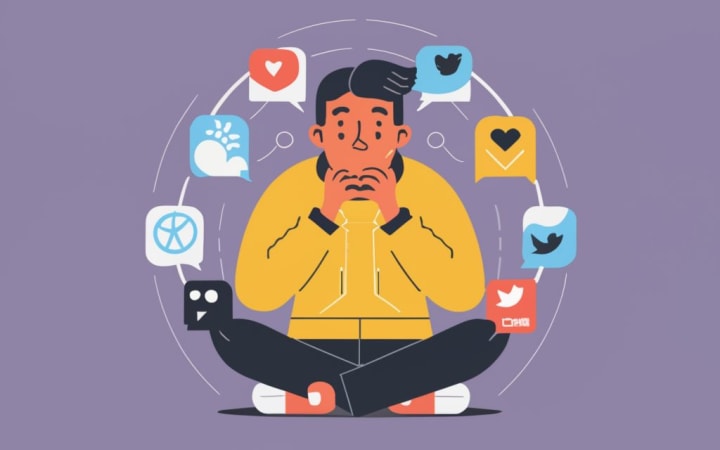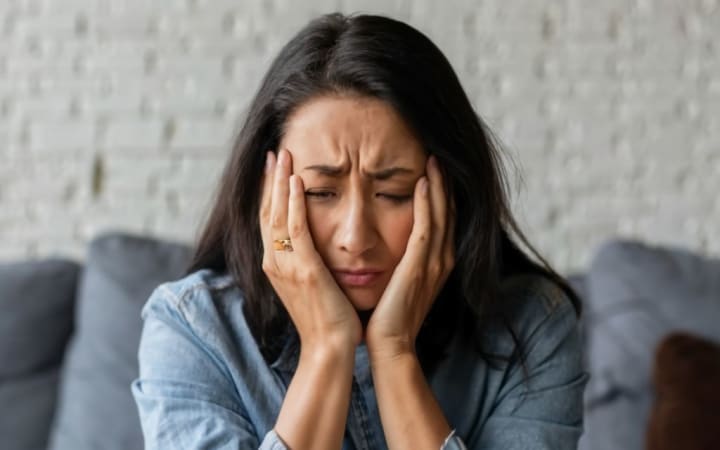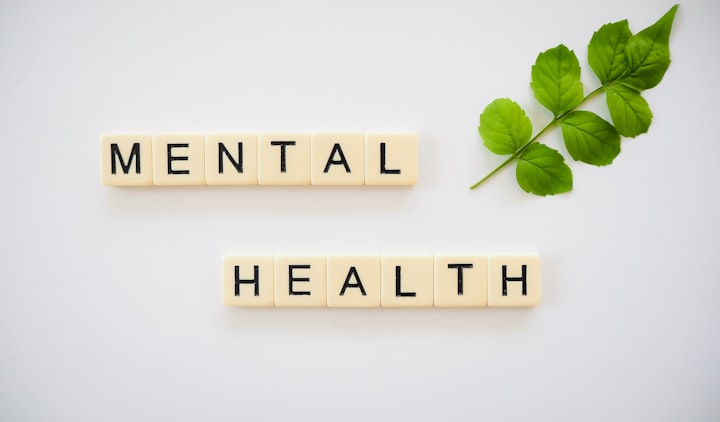The Dark side of Likes and Validation: How Social Media Impacts Mental Health
How Does Social Media Affect Mental Health?

In the age of social media, it's hard to go a day without scrolling through Facebook, Instagram, or Twitter to keep up with the lives of friends and acquaintances. While these platforms have undeniably transformed the way we communicate and connect, there is a darker side to our digital fixation. The pursuit of likes, comments, and validation on social media has slowly eroded our mental well-being, giving rise to a wide range of psychological issues that can harm our self-esteem, self-worth, and overall mental health.
Constant exposure to carefully curated yet unrealistic portrayals of other people's lives has led many of us to compare ourselves unfavorably. Seeking external validation through likes and comments has become the norm, deluding us into thinking that these virtual metrics determine our worth. The pressure to maintain an appealing online presence, paired with the fear of missing out on important events or trends, can be overwhelming. This incessant pursuit of validation often leads to feelings of inadequacy, anxiety, depression, and a distorted sense of reality. It's time to delve deeper into the impact of social media on our mental health and explore ways to maintain a healthy balance in the digital world.
Also Read: Proven Strategies for Boosting Mental Health Naturally
How does Social Media affect Mental Health?
In today's digital age, social media has become an integral part of our lives, shaping the way we connect with others and consume information. While there are undoubtedly many benefits to these platforms, there is also a darker side that is increasingly being recognized: its impact on mental health.
One of the most significant ways that social media affects mental health is through the cultivation of unrealistic expectations. Through carefully curated posts and filters, individuals often present an idealized version of themselves and their lives, leading others to compare themselves unfavorably. This constant exposure to seemingly perfect lives can lead to feelings of inadequacy, low self-esteem, and even depression in some cases.
Moreover, the addictive nature of social media can have detrimental effects on mental health. Platforms are designed to be engaging and keep users hooked for as long as possible. This constant scrolling and seeking validation through likes and comments can create a never-ending cycle of comparison and self-doubt. FOMO, or the fear of missing out, is also prevalent in social media culture, as individuals constantly feel the need to stay up-to-date and involved in the virtual world. This constant need for validation and fear of missing out can seriously impact one's mental well-being, leading to increased stress and anxiety.
Another troubling aspect of social media is the prevalence of cyber bullying. With the anonymity provided by digital platforms, individuals may feel emboldened to engage in negative behaviors, leading to harassment and bullying. The constant exposure to hurtful comments and cyber bullying can result in significant emotional distress, especially for vulnerable individuals such as teenagers. This ongoing harassment can lead to decreased self-esteem, social isolation, and even suicidal ideation.
Additionally, the constant barrage of information and news on social media platforms can also negatively impact mental health. It is all too easy to be overwhelmed by the sheer volume of content, much of which may be distressing or triggering. Continuous exposure to negative news, graphic images, and polarizing viewpoints can take a toll on one's emotional well-being, leading to anxiety, stress, and even post-traumatic stress disorder (PTSD) symptoms.
Furthermore, social media can contribute to feelings of loneliness and social isolation, ironically contradicting its purpose of connecting individuals. While it may seem counterintuitive, spending excessive amounts of time scrolling through virtual interactions can result in reduced meaningful face-to-face connections. The superficial nature of online interactions can lead to a lack of genuine connection, leaving individuals feeling lonely and disconnected from their real-life relationships.
Lastly, social media has been linked to sleep disturbances, primarily due to the blue light emitted by screens. The constant exposure to screens, especially during nighttime, can disrupt the natural sleep-wake cycle, leading to insomnia and poor sleep quality. Sleep deprivation, in turn, can have significant effects on mental health, exacerbating symptoms of anxiety and depression.
In conclusion, while social media undoubtedly has its benefits, it is crucial to recognize its potential negative impact on mental health. From cultivating unrealistic expectations and addictive behaviors to contributing to cyber bullying and feelings of loneliness, the dark side of social media can significantly impact our well-being. Individuals need to be mindful of their social media usage and take steps to protect their mental health, such as setting limits, engaging in offline activities, and seeking support when needed.
What are the 10 negative impacts of social media?

In today's digital age, social media has become an essential part of our lives. It allows us to connect with others, share our thoughts and experiences, and stay up-to-date with the world. However, as much as we enjoy the benefits, we must also acknowledge the negative impact that social media can have on our mental health.
Firstly, social media can lead to increased feelings of loneliness and isolation. As we scroll through our feeds, we often come across posts of our friends and acquaintances having fun and socializing. This constant exposure to other people's seemingly perfect lives can make us feel inadequate and left out, leading to feelings of loneliness and isolation.
Secondly, social media can be a breeding ground for cyber bullying. Its anonymity and the ability to hide behind a screen can embolden individuals to attack and harass others. The incessant online harassment can have severe consequences on the victims' mental well-being, causing anxiety, depression, and low self-esteem.
Moreover, social media can be addictive. The instant gratification of likes, comments, and notifications triggers a reward response in our brains, making it difficult for us to detach ourselves from our screens. This constant need for validation can lead to heightened levels of anxiety and a negative impact on our self-esteem.
Furthermore, social media can distort our perception of reality. We are often bombarded with carefully curated images and posts that showcase the highlights of people's lives. These idealized versions can make us feel inadequate, as we compare our own lives with the seemingly perfect ones we see online. This can lead to feelings of dissatisfaction and a negative impact on our self-image.
In addition, social media can promote procrastination and a decline in productivity. The endless scrolling, jumping from one platform to another, can consume hours of our time. This distraction from our daily responsibilities can lead to increased stress levels, as we struggle to meet deadlines or accomplish our goals.
Another negative impact of social media is its role in spreading misinformation. The rapid sharing of content without fact-checking can lead to the proliferation of fake news and conspiracy theories. This misinformation can cause anxiety and confusion, as we find it challenging to distinguish between what is true and what is not.
Moreover, social media often promotes unrealistic beauty standards. The constant exposure to photo shopped images and filtered selfies can distort our perception of what is considered beautiful. This can lead to body dissatisfaction, low self-esteem, and even the development of eating disorders.
Additionally, social media can negatively impact our sleep patterns. The blue light emitted by our screens can disrupt our melatonin production, a hormone that regulates sleep. This can lead to difficulty falling asleep and poor sleep quality, which in turn can contribute to increased stress and irritability.
Furthermore, social media can amplify feelings of envy and jealousy. Seeing others' accomplishments, adventures, and happy moments can fuel a sense of inadequacy and resentment. This constant comparison can lead to a negative impact on our self-esteem and feelings of unhappiness.
Lastly, social media can contribute to the decline of genuine human connection. While it allows us to connect with others, the superficial nature of online interactions often fails to provide the depth and authenticity that comes with face-to-face interactions. This can result in feelings of emptiness and a lack of meaningful connections in our lives.
In conclusion, while social media offers numerous benefits, we must also acknowledge the negative impact it can have on our mental health. From increased feelings of loneliness and isolation to distorted perceptions of reality and the promotion of unrealistic.
How can social media cause anxiety?

In this digital age, social media has become an integral part of our lives. It allows us to connect with friends, share our thoughts, and even create a personal brand. However, with its pervasive nature, social media can also have a detrimental impact on our mental health, causing anxiety to creep into our lives.
First and foremost, social media can generate feelings of inadequacy and low self-esteem. Platforms like Instagram and Facebook present beautifully curated feeds filled with people leading what seems like perfect lives. We are bombarded with images of exotic vacations, flawless bodies, and extravagant experiences, which can create an unrealistic standard of beauty and success. Constantly comparing ourselves to these unattainable ideals can lead to feelings of insecurity and unworthiness.
Moreover, the pressure to present a polished and edited version of ourselves can be overwhelming. Social media serves as a highlight reel of our lives, where we showcase our best moments. We often feel the need to present an idealized version of ourselves, and this constant need for validation can be anxiety-inducing. We fret over getting the perfect angle, crafting the wittiest caption, and accumulating the most likes. When our posts don't receive the desired response, it can trigger feelings of self-doubt and anxiety.
The fear of missing out (FOMO) is another significant aspect of social media that can contribute to anxiety. As we scroll through our news feeds, we come across countless updates about parties, social events, or achievements that we might have missed. It instills a sense of exclusion, which can fuel feelings of loneliness and anxiety. The constant exposure to what we are missing out on intensifies the fear of not belonging or being left behind, leading to heightened anxiety levels.
Furthermore, social media can be a breeding ground for cyber bullying and online harassment. The anonymous nature of online platforms allows individuals to hide behind a screen and engage in negative behaviors they wouldn't do in person. Cyber bullying can take various forms, including spreading rumors, making hurtful comments, or attacking someone's character. Victims of cyber bullying not only experience the immediate distress caused by these actions but also the long-term effects on their mental well-being. Such experiences can lead to heightened anxiety levels, social withdrawal, and even depression.
The constant exposure to a barrage of information and news on social media can also contribute to anxiety. The 24/7 news cycle and the overwhelming amount of information can be distressing, leading to a phenomenon known as "doom scrolling." Scrolling through negative news stories, catastrophes, and divisive debates can amplify feelings of vulnerability and anxiety. It becomes challenging to disconnect and find solace in a world that seems fixated on turmoil.
In conclusion, while social media has undoubtedly revolutionized the way we connect and communicate, it is crucial to recognize its potential impact on our mental health. The constant pressure to conform to unrealistic standards, fear of missing out, cyber bullying, and information overload can all contribute to feelings of anxiety. It's essential to find a balance in our online lives, setting limits on our consumption, being mindful of the content we engage with, and prioritizing our mental well-being above virtual validation.
Also Read: Proven Strategies for Boosting Mental Health Naturally
Why is social media bad for mental health and body image?
In today's digital age, social media platforms have become an integral part of our daily lives. We use them to connect with friends, share moments, and seek validation from others. But beneath the glossy surface, there lies a dark side to these platforms that can have a significant impact on our mental health and body image.
One of the primary reasons why social media can be harmful to mental health is the constant comparison it promotes. When we log onto our preferred platforms, we are bombarded with carefully curated images and updates from others. These posts often depict an idealized version of reality, showcasing only the best aspects of people's lives. But what we fail to realize is that most of these posts are carefully crafted, highly edited, and do not reflect the true essence of someone's day-to-day experiences.
The constant exposure to these seemingly perfect lives can lead to a phenomenon known as "social comparison." We begin to compare our own lives, achievements, and appearances to those we see on social media. This can sow the seeds of self-doubt and dissatisfaction, as we start feeling inadequate compared to the seemingly flawless lives of others. Over time, this persistent comparison can have a detrimental effect on our mental well-being, leading to feelings of anxiety, depression, and low self-esteem.
Moreover, social media can exacerbate body image concerns and contribute to the development of eating disorders. With filters and photo-editing tools at our disposal, it has never been easier to alter our appearances in pictures. We can smooth out imperfections, enhance certain features, and create an illusion of perfection. But behind these altered images lies a dangerous message – that beauty only exists within a narrow and unattainable standard.
Scrolling through countless images of flawless bodies can put immense pressure on individuals to conform to societal ideals of attractiveness. This constant exposure to unrealistic body standards can lead to a negative body image, as individuals begin to perceive themselves as falling short of these unattainable ideals. The consequences of such distorted body image can be severe, ranging from body dissatisfaction and disordered eating behaviors to more severe mental health issues like anorexia nervous or body dysphoric disorder.
Another aspect that contributes to the detrimental impact of social media on mental health is the addictive nature of these platforms. Countless studies have shown that constant validation, in the form of likes, comments, and shares, releases dopamine in our brains – the same feel-good chemical associated with other addictive behaviors. This instant gratification can draw us into a never-ending loop of seeking external validation, leading to an unhealthy dependence on social media for our self-worth.
Ultimately, it is important to recognize that social media is not an accurate representation of reality. Behind the filters and perfectly curated posts, lies a multitude of insecurities and flaws that are often concealed. Acknowledging this can help us overcome the negative impact of social media on our mental health and body image. Instead of comparing ourselves to others, we should focus on embracing our uniqueness and practicing self-compassion. Taking breaks from social media, engaging in offline activities, and seeking support from loved ones can also play a crucial role in maintaining a positive self-image and preserving our mental well-being.
In the age of social media, it's become all too easy to get caught up in the pursuit of likes and validation. But what we often don't realize is that this constant need for external approval might be taking a toll on our mental health. It's essential to understand that while social media platforms offer us a way to connect and share, they can also create a breeding ground for comparison, unrealistic expectations, and even loneliness.
The pressure to create the perfect image and gain validation from others can lead to anxiety, depression, and a diminished sense of self-worth. It's crucial to be aware of the dark side of likes and validation, find a balance between our online and offline lives, and prioritize our mental well-being. Perhaps by shifting the focus from external validation to self-acceptance and cultivating genuine connections, we can reclaim control over our social media experiences and foster a healthier digital environment for all. Remember, the number of likes does not define our worth; it's how we feel about ourselves that truly matters.
Also Read: Proven Strategies for Boosting Mental Health Naturally
Tags used: how social media affect mental health, how social media affect mental health essay, how does social media affect teenagers' mental health,how does social media affect mental health negatively, how does social media affect mental health statistics, how does social media affect mental health positively, how does social media affect teenagers' mental health statistics, how does social media affect children's mental health, how does social media affect mental health in youth, how does social media affect mental/emotional health, how does social media affect young people's mental health, how social media affects mental health article, how social media affects mental health and body image
About the Creator
Naveen Kumar
Hi everyone! I am an A-level graduate and I love to write on Health topics. I have succumbed to the passion of writing which has pushed me to learn more about different essay writing techniques and article writing techniques.






Comments
There are no comments for this story
Be the first to respond and start the conversation.